|
The content of our intermittently posted High 5 lists tend to be whim-of-the- moment suggestions, and if they were properly planned then I should have seen this one coming some time ago. Today the world has been paying tribute to William Shakespeare by marking the 400th anniversary not of his birth but his death. This always struck me as odd. If you're going to celebrate any great talent then surely it makes more sense to do so on the anniversary of the day he or she came into the world, not the one on which they sadly departed from it. That's why we have birthday parties instead of whooping it up to mark five years since our best friend passed away. But presumably because they don't want to wait another 48 years to mark the 500th anniversary of his birth, learned people everywhere have chosen today to celebrate Shakespeare's life and work today, and why the hell not?
I've decided to mark the day in my own small way by picking five personal favourite works from film and television that were inspired by Shakespeare plays, but which are not literal adaptations of them. Thus any film that retains the title and dialogue of the play, even if it shifts or updates its setting, does not qualify, but this still leaves enough works to fill this list something like ten times over. For the fun of it I've tried to opt for a few less obvious choices, which painfully means I've not included the likes of West Side Story, Chimes of Midnight and the Kurosawa trio of The Bad Sleep Well, Throne of Blood and Ran (which is soon to do the rounds in a new 4K restoration). All are brilliant films which deserve their own list, but I've decided to go for a slightly quirkier quintet. It's purely by chance that three of the five were inspired by the very same play...
Having selected the topic at the very last minute and thrown it at Camus by email in case he had an hour free to draw up his own selection, I failed to outline the above listed criteria, so he's deviated from it and included a couple of direct film adaptations of plays, but since he wrote his piece in a fraction of the time that I pulled mine together, I'm not about to start crying foul on him for that.
And so to the films, which as usual were pulled exclusively from memory without recourse to research (except to check release dates, of course).
Starting this a little later than usual doesn't grant me enough time to devote more than a meek paragraph on each of my five choices but I hope the five I did chose do their bit for celebrating one of this island's most extraordinary men.
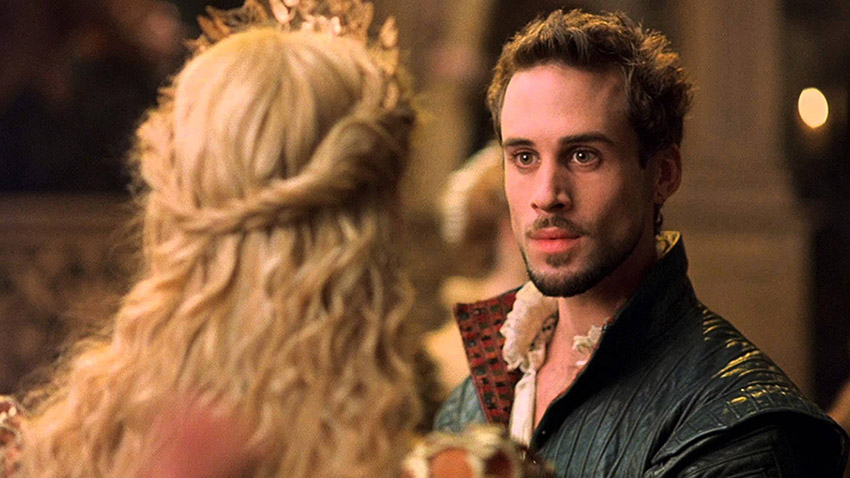
Shakespeare in Love (1998)
Before goop.com managed to deposit a certain Gwyneth Paltrow into a personal and somewhat delusional über-rich fairy land, she was a fine actress. She was suitably lauded for her role as muse in this imaginative take on a slice of Shakespeare's time and how his own craft was taken from his life experience as writers Tom Stoppard and Marc Norman created it. The leads (Paltrow and Voldemort's younger brother Joseph Fiennes) do a terrific job but a great deal of the entertainment value comes from the comic asides. Of course, there's the pumped up vanity of Ben Affleck and the powerful but fame-seduced Tom Willkinson but Geoffrey Rush's always put upon Henslowe is a delight. Aside from his oft repeated and always amusing "It's a mystery," the line that always seems to make me smile is "Comedy, love and a bit with a dog. That's what they want." And he's right.
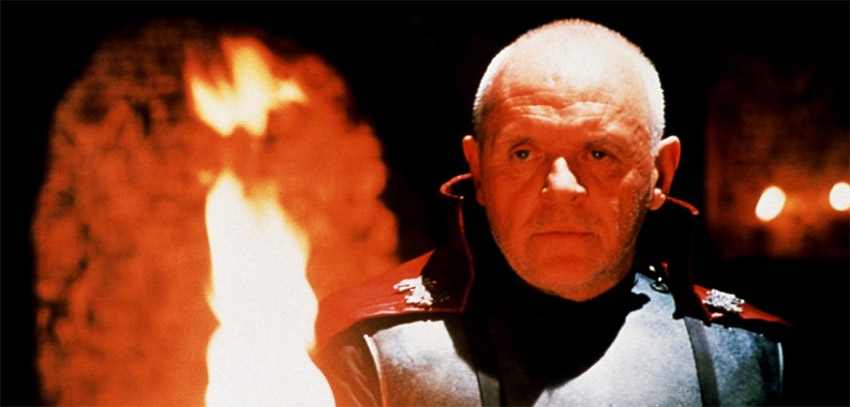
Titus (1999)
There are movies whose plots and performances don't resonate particularly on a personal level despite the respect I have for director Julie Taymor's evident talent but they are well remembered for other reasons. Taymor's remarkable blending of styles, eras and design for her version of the bard's Titus Andronicus features one of the most startling images of the result of human depravity that I've ever seen on screen. When I first saw it (on video, shame) the image burned its way into my mind so much so that I can recall it while being smitten by the grotesque act of Will (sorry) that it would take to mete out such a punishment to any other living person. And all to get at someone else... If you really want a preview of the image, it involves an unusually disgusting act of violence that leaves a very broken young woman with stuffed-in-wrists twigs for fingers on handless arms imploring, blood oozing out of a screaming but mute mouth, her tongue having been cut off. Oh, you do not forget images like those. Thanks Will. For the words and pictures.
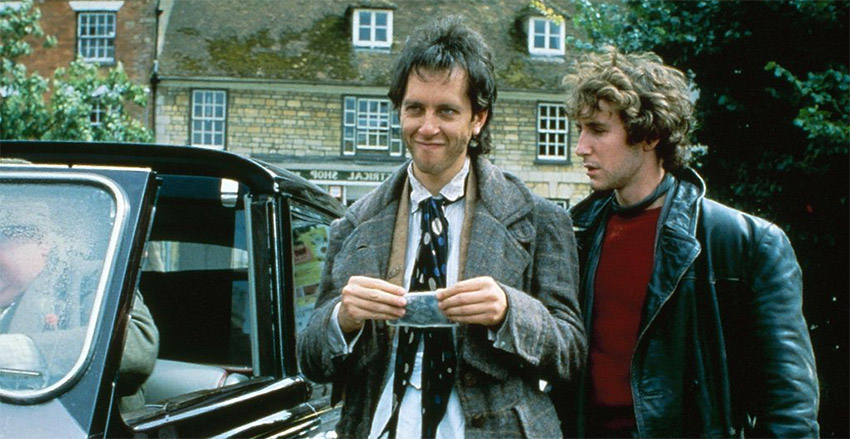
Withnail and I (1987)
As Withnail (Richard E. Grant) says goodbye to Marwood (Paul McGann) in the rain, he starts to understand that an era and perhaps a friendship has passed. One of the two has got on the metaphorical bus going forward leaving the other to his own devices. In front of a wolf, hanging on an iron fence, Withnail gives us his 'What a piece of work is a man...' from Hamlet. However he was directed, the speech is truly heart-breaking, irony dripping in concert with the rain. Grant's performance is unforgettable as it has been throughout this glorious film. When great actors really get their teeth into the best of the Bard, then the hairs raise on the back of your neck and you know you're in the company of someone of rare talent delivering lines of astonishing power... The paragon of animals, indeed.
Blu-ray review >>
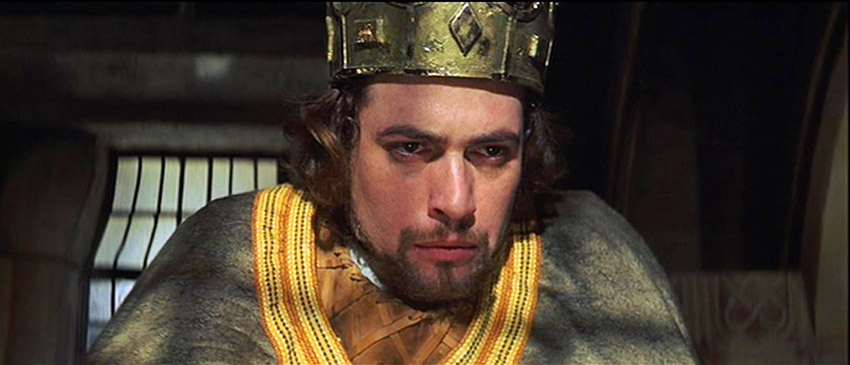
Macbeth (1971)
Memories of this film are surprisingly vivid even though I tried really hard not to see what was going on. Roman Polanski's relish in bringing this mad Scotsman and all the attendant barbarism to the screen meant there seemed to be severed heads everywhere. I have since found out that there is violence in the movie that had nothing to do with Shakespeare's original play. Thanks, Roman. But then Polanski was a child in Poland during the Nazi occupation. I was in my mid teens and on a school trip we were exposed to this horrorfest in the interests of igniting a passion for the Bard. Ahem. It scared the bejesus out of me. Even if it wasn't shot on 35mm anamorphic, (just checked, it was, Todd-AO 35) I certainly remember trying to keep the giant screen hidden behind my fingers and failing at so many moments. But I wasn't so young not to understand what an extraordinary presence and sex appeal Francesca Annis as Lady Macbeth had and undoubtedly still has. In fact I was so conflicted watching this movie, you could say that it was a battle between sex and violence for my attention and sex in this case won hands down.
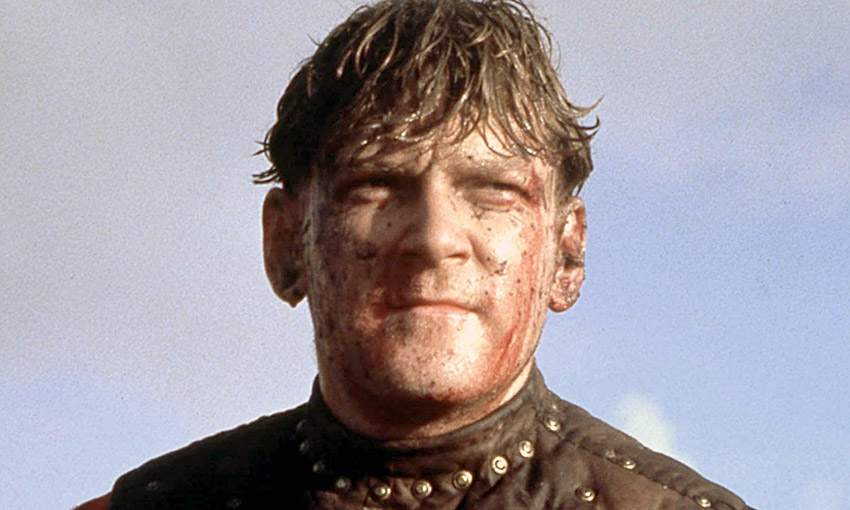
Henry V (1989)
When Laurence Olivier produced, directed and acted in his Oscar winning production of Henry Vth in 1944, it was held up as a superior adaptation, a moral booster for the troops during World War II and the first time a Shakespeare play had been filmed and actually made a decent profit. In the 80s, a young man was making a name for himself as the next Olivier (I mean, who writes their autobiography at the age of 29?) He's directed a Marvel tent pole movie (Thor) and starred as a villain in the rebooted Jack Ryan franchise but he's probably more famous for being a Shakespearean actor. There are many strings to his bow. When Kenneth Branagh all but recreated Olivier's feat in 1989 for a considerably lower budget (he was spared producer's duties), not a great deal was expected. The film was a triumph on many levels. It was my first exposure to composer Patrick Doyle whose score was sublime but it's one particular shot and cue that stands out and will never be forgotten, especially by those involved in it. Branagh carries the corpse of (of all people) Christian Bale while Doyle's cue of 'Non Nobis Domine' rouses to a spectacular climax. Look at Branagh... That's not acting. He's in real discomfort but considering it's a long tracking shot of men walking through a muddy field, Doyle's rendition and orchestration of the Latin hymn elevates the scene to an almost mythic beauty.
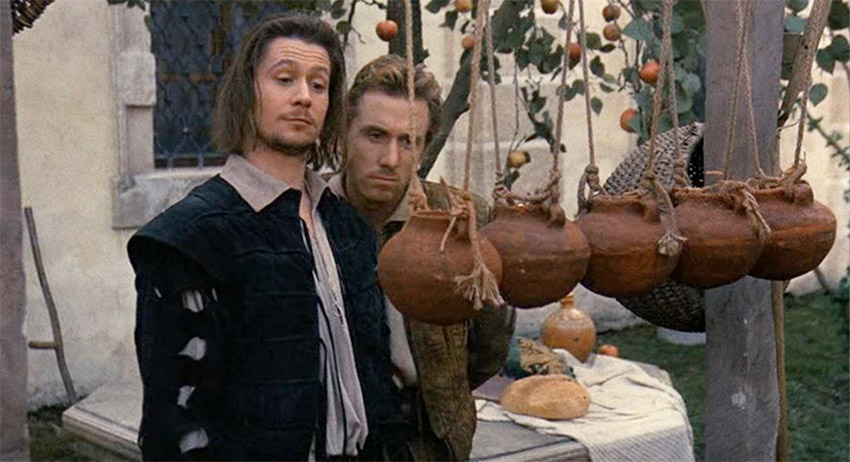
Rosencrantz and Guildenstern are Dead (Tom Stoppard, 1990)
Based on a play constructed around two minor characters from Shakespeare's Hamlet and incorporating some of the original dialogue, Tom Stoppard's deliciously devised and written absurdist tragicomedy made an unexpectedly rewarding transition to film under Stoppard's own direction. Worth the entry fee alone for two glorious central performances from Gary Oldman and Tim Roth, but there's so much more to enjoy here, and this is one of the few films where the Shakespearian text has been matched with dialogue that is as classy and witty as its inspiration. The tennis match-style game of questions is genuinely dizzyingly brilliant in its writing and performance.
DVD review >>
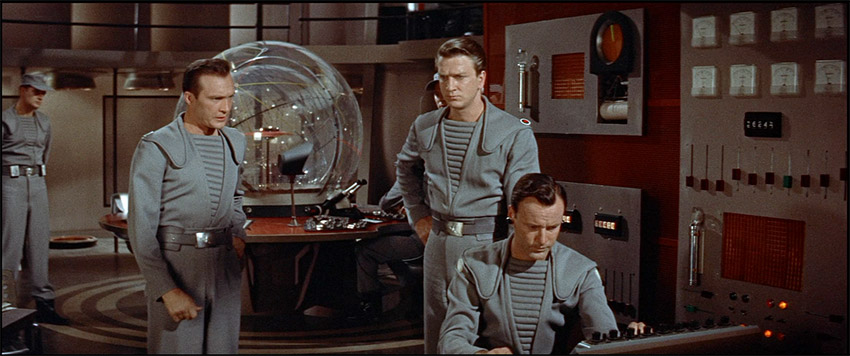
Forbidden Planet (Fred McLeod Wilcox, 1956)
A spaceship from Earth (captained by a youthful Leslie Nielsen) lands on the distant planet of Altair IV to investigate the fate of an expedition sent there 20 years earlier, and discovers that the party was wiped out by an unspecified planetary force, and that scientist Dr. Edward Morbius and daughter Altaira are now the only survivors. But when an invisible creature attacks the landing party, it starts to look as if Morbius himself has somehow triggered its arrival. The first film set entirely on a distant planet and the first to feature an Earth-built, faster-than-light spaceship, Forbidden Planet is now regarded as a bona fide science fiction classic, yet its futuristic story is actually a reworking of Shakespeare's The Tempest, with Morbius fulfilling the Prospero role and the Monster from the Id that Morbius unwittingly unleashes standing in for the titular storm of the play.
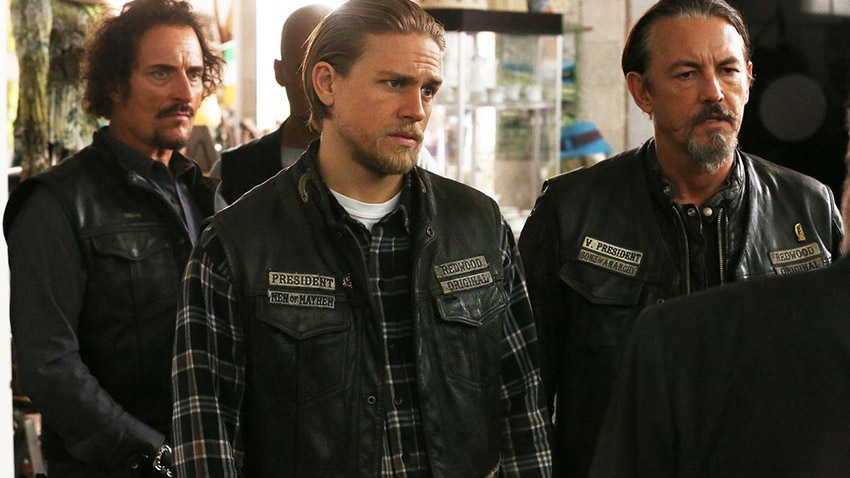
Sons of Anarchy (Kurt Sutter, 2008)
If you've never seen Kurt Sutter's 7-series tale of gun-running, in-fighting, family feuds and brotherly love based around an American motorcycle gang, this may seem a rather peculiar inclusion, but check out the basic setup. Jax Teller is Vice-President of the Sons of Anarchy Motorcycle Club (Redwood Original, if you please), whose president, Clay Morrow (played by site favourite Ron Perlman), married Jax's mother Gemma after killing his biological father and club co-founder John Teller, a crime that Jax is initially unaware of. Ring any bells? It's with good reason that the series has been described as "Hamlet on Harleys" – the club members are presented almost as amoral modern-day knights of the court, there are a number of sly references to the play, Hamlet stand-in Jax later starts to show signs of irrational thinking, and Season 5 seems to go out of its way to outstrip the Bard in the volume and severity of its tragedy.
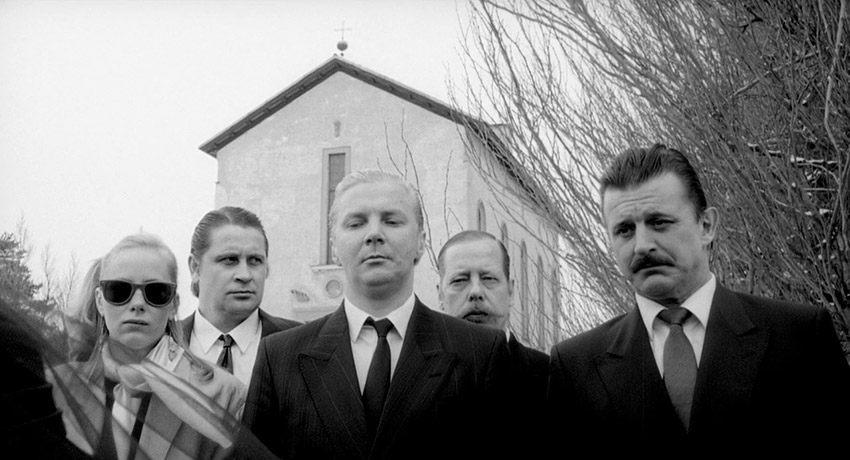
Hamlet Goes Business (Aki Kaurismäki, 1987)
Having adapted Dostoyevsky for his first feature, just two films later Finnish master of deadpan Aki Kaurismäki chose to take on Shakespeare – I'm presuming you've worked out which play from the title. Here Hamlet is the son of a powerful and wealthy industrialist who was poisoned by his colleague Klaus in order to clear the way for him to marry Hamlet's mother and take over the business. As in the play, Hamlet is tipped off to the crime by the ghost of his father ("Get on with it," is Hamlet's first response, "It's cold and I don't want to be late for dinner"), his behaviour becomes erratic and the story climaxes in a duel, albeir a brief one with a most bizarre ending. It's an intriguing, enjoyable and surprisingly faithful adaptation, and the transposition of royal power-play to the world of big business fits the story like a glove.
DVD review >>
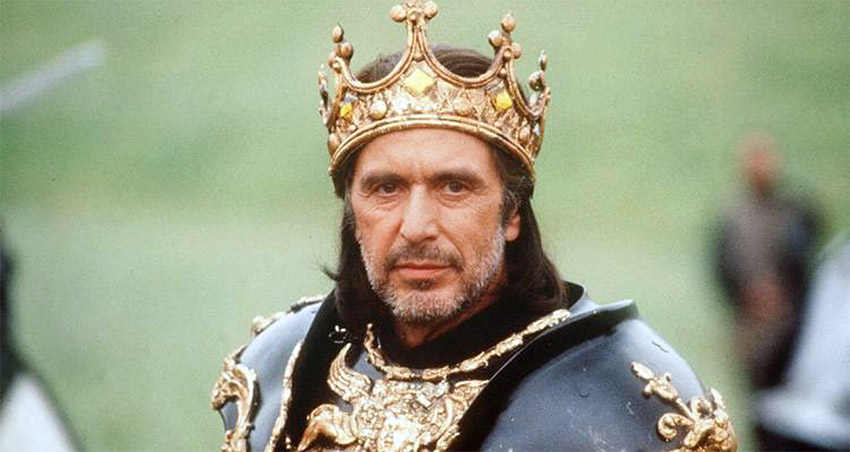
Looking for Richard (Al Pacino, 1996)
If you've never managed to get your head around Shakespeare's writing or have always found the idea of actually engaging with one of his plays a little intimidating, you'll find few better ways in than this hugely entertaining documentary from first time feature director and Shakespeare enthusiast Al Pacino. Yes, that Al Pacino. Built around the preparations for a production of Richard III, the film blends sometimes electrifying line readings and rehearsal footage with vérité documentary of Pacino and his collaborators as they explore the specific appeal of Shakespeare's writing, accidentally set of the fire alarm at Shakespeare's birthplace, are stopped from filming in New York by the police because they don't have a permit, and try to persuade members of the public to attend an open-air production of the play. Pacino's fiery passion for his subject is neatly captured by is outrage at the passer-by who dismisses the idea of attending with the comment, "It sucks." |